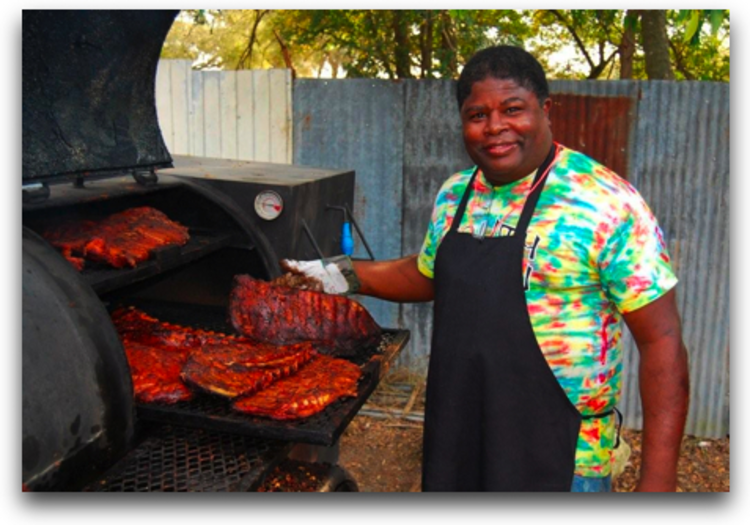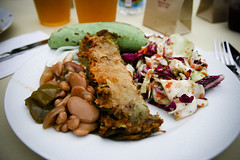
Beyond Brisket: My Interview with Austin BBQ Chef David “D.T.” Terrell
SmarterFitter.com - November 08, 2009
Originally published on Smarterfitter.com.
"I consider the side dishes as important as the barbecue, and these sides should taste as good as the meat. I see it all as part of the same experience even though many people just grab some "Q" and start munching. Some people are not into meat and I try to be sensitive to those feelings; vegetarians are okay with me." - David "D.T." Terrell, Austin Barbecue Company
"BBQ" is not a word you often see with phrases like "veggie friendly" and "health food." But Austin BBQ chef David "D.T." Terrell proves there's more to BBQ than brisket and ribs.
David catered my friend's wedding reception last summer in Austin, Texas. I met him at the buffet table, where he was serving up slabs of beef and pork from a giant smoker and dishing up an impressive array of side dishes to go with it - barbecue beans, potato salad, cole slaw, enchiladas, and plenty of tortillas and extra sauce.
 As a vegetarian, the meat choices were off my radar (though I've been told I was missing out on something spectacular) so I naturally veered for the beans, salad and enchiladas. As I took my first bite - a tender, deeply flavored butter bean - I could tell that the food had been prepared by someone who cares about quality. And as I finished my plate, I was starting to see barbecue in a whole new light.
As a vegetarian, the meat choices were off my radar (though I've been told I was missing out on something spectacular) so I naturally veered for the beans, salad and enchiladas. As I took my first bite - a tender, deeply flavored butter bean - I could tell that the food had been prepared by someone who cares about quality. And as I finished my plate, I was starting to see barbecue in a whole new light.
Barbecue is more than just meat. It's also about delicious side dishes, whole foods like beans and corn, fresh vegetables and quality ingredients. This goes for the meat, too, where often times the entire animal is utilized for food. Even as a vegetarian, I can appreciate a chef who wastes nothing and respects the animal by cooking it with care and attention.
On my second trip up to the buffet table, I had to ask David about his marvelous beans. He not only shared a few secrets about his favorite "non meat", but also agreed to an interview. Thanks to David for sharing his thoughts on beans, barbecue, cajun cuisine and even Indian dal and tofu.
What is barbecue all about? How would you explain it to someone who's never had barbecue before?
Barbecue is just meat cooked by heated smoke. If one is cooking directly over the heat source, that is not barbecue; that is grilling. The smoke comes from various types of wood like oak, pecan, hickory, and other fruit tree woods. In Texas, the hot smoke is mainly from mesquite and oak; other locales have their own favorites.
What's special about smoking? How is it different from other types of cooking like direct heat?
The smoking of meat adds special favor and can also be a way to preserve the meat by removing moisture; that is how jerky is made. Native Americans were able to preserve buffalo and eat that meat throughout the long winters in the American West. Meat smoked long enough will turn a pinkish red, and barbecue lovers examine their cuts to see the "smoke ring", or ring of red coloring.
Direct heat generally cooks faster and leaves a much different flavor than meat cooked by indirect smoke.
What made you decide you wanted to be a barbecue chef?
I became a barbecue chef because my father, a military man, grilled and smoked meat frequently and was a native of Memphis, Tennessee, one of America's barbecue centers.
Where did you learn how to barbecue?
My father taught me the basics of smoking and grilling, and I learned more over the years from observing others. As I say, "I only steal from the best." The education continues today; as you know one can always learn something new if your mind is open.
You do a lot of cajun food. Tell me about your connection with New Orleans.
New Orleans is a city that I have visited many times and I appreciate its uniqueness in both culture and history. The food, of course, stands apart from what is considered typically American. I have learned how important sauces and spices are in combination with the main course. The food alone makes New Orleans worth visiting.
I was really impressed by the quality of your ingredients. Where do you get your food and how do you choose your suppliers?
I try to use the freshest ingredients, and I make what I can from "scratch". Finding fresh meats and vegetables in the local markets here in Central Texas is not too hard; creating good-tasting meals for discriminating palates is the real challenge.
Now I know barbecue is all about the meat, but what about the sides? How much emphasis do you put on your side dishes?
I consider the side dishes as important as the barbecue, and these sides should taste as good as the meat. I see it all as part of the same experience even though many people just grab some "Q" and start munching. Some people are not into meat and I try to be sensitive to those feelings; vegetarians are okay with me.
I'm a vegetarian, so I don't really do the smoked meat thing. Can other foods besides meat be smoked? Would it be sacrilege to smoke tofu??
Yes, other foods besides meat can be smoked and taste quite good, even tofu. I even have a separate, special grill just for non-meat items so I can show vegetarians no meat came in contact with their food.
Your beans rock my world - how do you cook them? Do you use dry beans? What do you season them with? Do you cook them with spices or add the spices afterwards?
Ah yes, the beans. I also love beans so I give them special attention. I use dry beans and soak them in water overnight, then add spices and vegetables. Depending on whom my guests are I add chilies, brown sugar, and even beer. Various peppers may find their way into the beans, and I sometimes use some meat to enhance flavor, and make the same version without meat for non-meat eaters.
By the way, I've traveled throughout India and have eaten lentils at roadside food stands, with dal on the side, so I learn from everyone.
I'm a cabbage lover and adored your slaw. Your website mentions "Texas cole slaw" and "jalapeno cole slaw" - what's the difference? Any cole slaw secrets you wish to share?
OK-I'll spill the beans. Jalapeno cole slaw is made with both red and green cabbages and a homemade dressing, with tiny bits of jalapeno peppers, of course. Once made, it should be put in a cold place, like a fridge, for at least twelve hours. Texas cole slaw is the above without the jalapenos, and maybe a different dressing. Cole slaw, as you know, can be made with a variety of salad dressings.
What is your favorite food to cook with?
My personal favorite food to cook is pork because of the variety of pork barbecue one can cook, like ribs, shoulder, butt, sausage, whole pig, loin, and parts I won't mention.
Okay, now what is your favorite non-meat food to cook with?
Beans are my favorite non-meat meal, and there are so many different beans, each with their own flavor. Red, Lima, kidney, pinto, black, black-eyed, navy, and others.
What's your favorite meal?
My favorite meal is smoked duck with cornbread dressing, with New Orleans-style bread pudding with whiskey sauce.
Where do you go when you want to eat at a restaurant?
I like to eat the creations of other chefs and unique foods. People will find me eating sushi, Chinese and Korean foods at local restaurants, though I also like to eat at Indian food buffets.
Best piece of advice you would give a home barbecue enthusiast?
The best advice I would give a home barbecue enthusiast is to keep improving your product, taste and share with others, and pass your knowledge along.
Any vegetarian recipes you could share?
Yes, soak two cups of dry beans of your choice overnight, then add your favorite seasoning and peppers and cook in a covered pot until the beans are tender. Enjoy.
Thanks again to David for the wonderful interview. David runs The Austin Barbecue Company, a gourmet catering service in central Texas. If you happen to live in Texas and are a bit stumped for a Thanksgiving or Christmas dinner, why not see if David can help?
